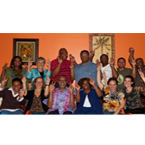Doctoral Candidates Design Public Projects To Transform Communities
February 1, 2013
 Ask a seminarian: Why did you enter the D.Min. program? Their eyes will glow as they tell you that, deeply engaged in their ministry already, they felt compelled to work on a transformative project that branches out beyond the walls of a traditional church. The program provides structure to strengthen their project with dialog and analysis, public policy and theology, and make it available for use by others in urban ministry settings.
Ask a seminarian: Why did you enter the D.Min. program? Their eyes will glow as they tell you that, deeply engaged in their ministry already, they felt compelled to work on a transformative project that branches out beyond the walls of a traditional church. The program provides structure to strengthen their project with dialog and analysis, public policy and theology, and make it available for use by others in urban ministry settings.
This February we caught up with candidates in both tracks of the Seminary’s program.
– In the general track in Metro-Urban Ministry, students now in their third year are actively running projects. Read more about the Trenton public school project of Rev. Lola Akiwowo.
– In the prison ministry track, Prisons, Public Policy & Transformative Justice, candidates completed the second of three one-week intensives and are now forming covenant groups and imagining projects on paper. Read more about the auto-ethnography project for prison inmates that Rev. Valerie Arthur is beginning to formulate.
The focus of both tracks is Metro-Urban Ministry, where metro-urban refers to a metropolitan area that is multi-cultural, multi-lingual, multi-racial, and economically diverse. At the center of the degree is a ministry project-a program, process or policy-that is not a piece of writing alone but a timeline of action that candidates take in the community. The project can take many forms such as programs for prison inmates or community volunteers or the drafting and advocacy of a new public policy. Seminarians lead a covenant group-a team of members of congregations and communities including teachers, leaders, healthcare professionals, social service providers, law enforcement professionals-who commit to the project and provide support and direction.
